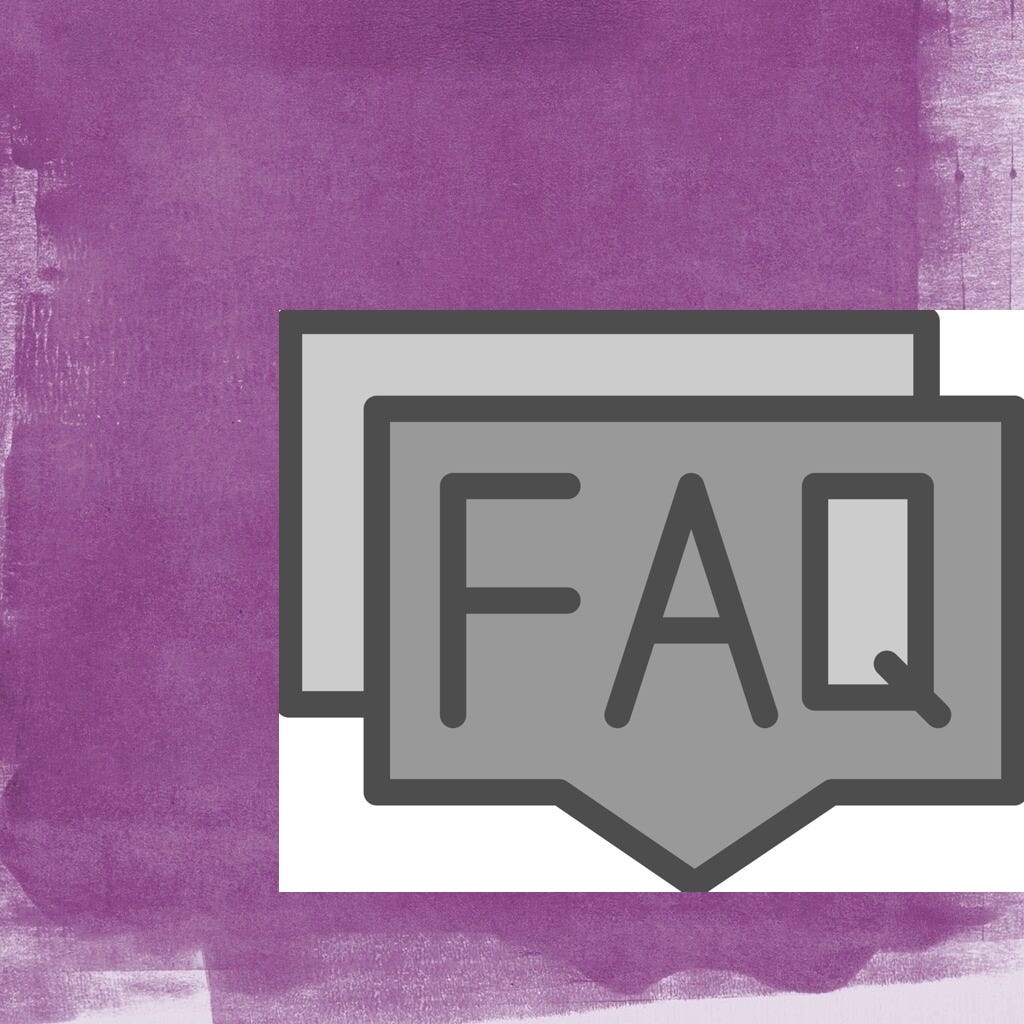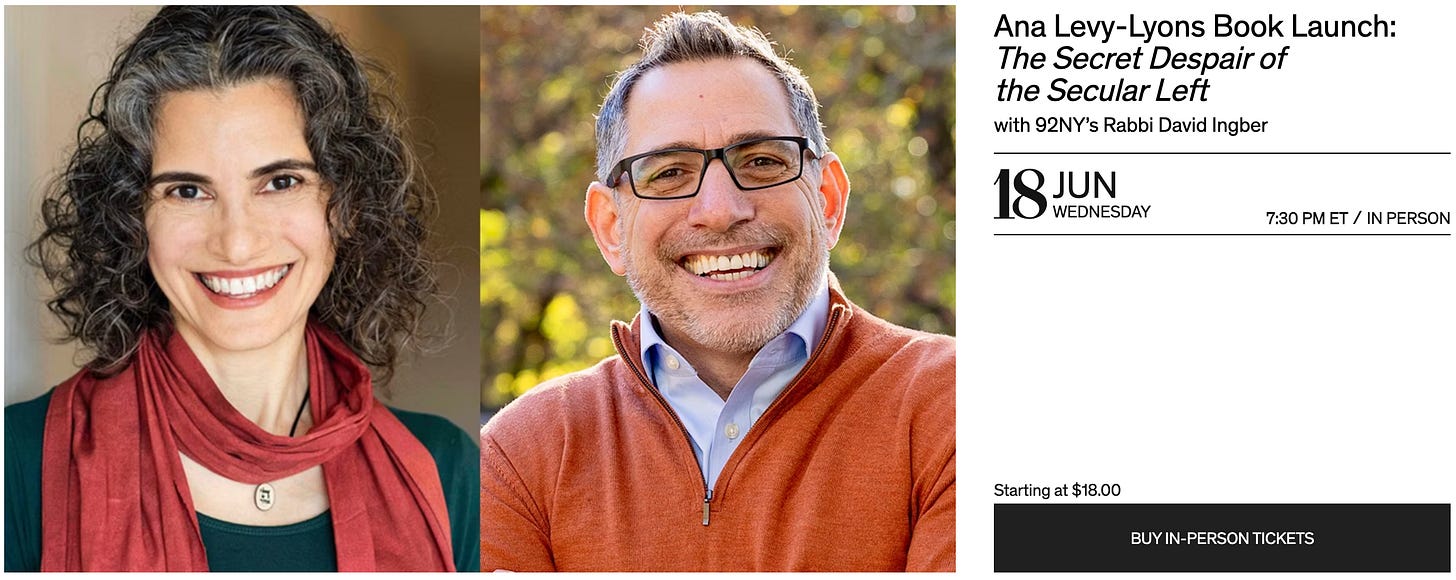Why Are You Picking on the Secular Left?
…and Other FAQs About My New Book
My book, The Secret Despair of the Secular Left, has just come out and I thought it might be helpful to address some frequently asked questions (well, to be honest, some of them are frequently asked, and others I imagine may be frequently asked in the future, like, once people have read the book).
Q. Why are you picking on the secular left? Don’t religious people and conservatives also despair these days?
A. Of course! But I write what I know, and the culture of the secular left has been where I’ve spent most of my life – from my upbringing to my former career as a UU minister. At the same time, I’ve always felt like only a participant-observer in that world. My personal journey has taken me in a different direction. Mystical experiences, my Jewish religious path, rabbinic education, and my family life raising children in New York City have all opened up a different type of consciousness to me. They’ve allowed me to see (and name) a soul-level grief and despair in our culture that is often invisible – because it’s the water we swim in. And they’ve helped me to imagine other, countercultural possibilities.
Q. “Secret despair?” Is it really so secret? Isn’t it obvious?
A. Yes, it’s obvious if we listen to the cry of our souls. But many of us are invested in the choices we’ve made and the individual freedoms for which we’ve (understandably) fought. It’s hard to admit that the very acts that may have felt liberatory at one time – like rejecting religious traditions – are now exposing us to a different kind of suffering. It’s a quieter suffering, but real nonetheless. It’s the suffering of the languishing, passive, consumer life, free of obligations to anything larger, constantly distracted by our screens, anxious, lonely and grasping at threads of simulated connection, even with AI bots; lives of less creativity, less relationship, less sex, less family, and less reason to bring new life into the world.
Q. Really? I’m a member of the secular left, and I don’t have despair, secret or otherwise.
A. Great! If you don’t resonate with the sense of subterranean spiritual malaise that I’m describing, this book may not be for you.
Q. Are you promoting tribalism?
A. Yes. But not the kind of tribalism where you try to destroy other tribes so your tribe can take over the world. The kind of tribalism where we are proud and deeply rooted in our own traditions and also honor and learn from those of others. Rabbi Zalman Shachter-Shalomi used to offer the metaphor of our traditions as organs in the human body. They each have different strengths and different functions. We need each to be itself and do its thing, and we need them all in order to survive. I like this metaphor particularly because in a human animal, all the organs are fed by the same bloodflow and directed by the same brain. All our human traditions flow from the lifeforce of the earth herself and are different manifestations of the divine mind.
Q. Is this a Jewish book?
A. It’s a book describing the world as I see it through my own spiritual lens, which is a Jewish spiritual lens. But my intention is that this book will be for everyone. For example, to explore the levels of alienation we experience, I use three Biblical Hebrew words that don’t have exact translations in English: nefesh (body-soul composite), am (a people/ community/ family) and adamah (earth/ land/ soil from which humans and all living creatures are formed). I hope that concepts like these will speak to you whatever your religious persuasion is (or isn’t) and support you in naming and framing for your own life.
Q. Is this book progressive or conservative?
A. It doesn’t fit neatly into those categories. Some aspects of it – like its ecological orientation – are (sadly) coded “left” in our culture. Others – like the call to return to the religious traditions of our heritages – are coded “right.” It draws from diverse sources, ranging from The 1619 Project (progressive) to the work of Rod Dreher (conservative). I’m hoping that this book can help elevate our discourse beyond today’s political polarization and engage our deeper cultural and spiritual struggles. From my perspective, despite how much the two “sides” hate each other right now, in terms of these struggles we are more similar than different. We all suffer in different ways from hyper-individualism, disembodiment, and alienation from the earth. We are all animals living on this planet, swept up in the same energetic forces, and yearning – on some level – to reinhabit this holy world.
Other questions? Put them in the comments and I’ll try to answer them. Or email me privately at connect@analevylyons.com. Or, better yet, read the book! Your support, interest, and engagement mean the world to me.
Book Launch
If you’re in the NYC area, please join me this Wednesday, June 18, 7:30pm to celebrate the book launch with the brilliant and open-hearted Rabbi David Ingber at the 92nd St. Y in Manhattan.
In the spirit of the book, it’s in-person only :-) It would be great to see you there!
Info and registration: https://www.92ny.org/event/ana-levy-lyons




I am almost done reading secret despair. Honestly, it’s a must read. Ana articulates in super intelligent language many of the deeper thoughts, experiences, and insights that have been gnawing at me for a while, as neither the left nor right seem to have fully satisfying messages.
"But not the kind of tribalism where you try to destroy other tribes so your tribe can take over the world. The kind of tribalism where we are proud and deeply rooted in our own traditions and also honor and learn from those of others."
Therein lies your biggest challenge. Good luck with all of your efforts.